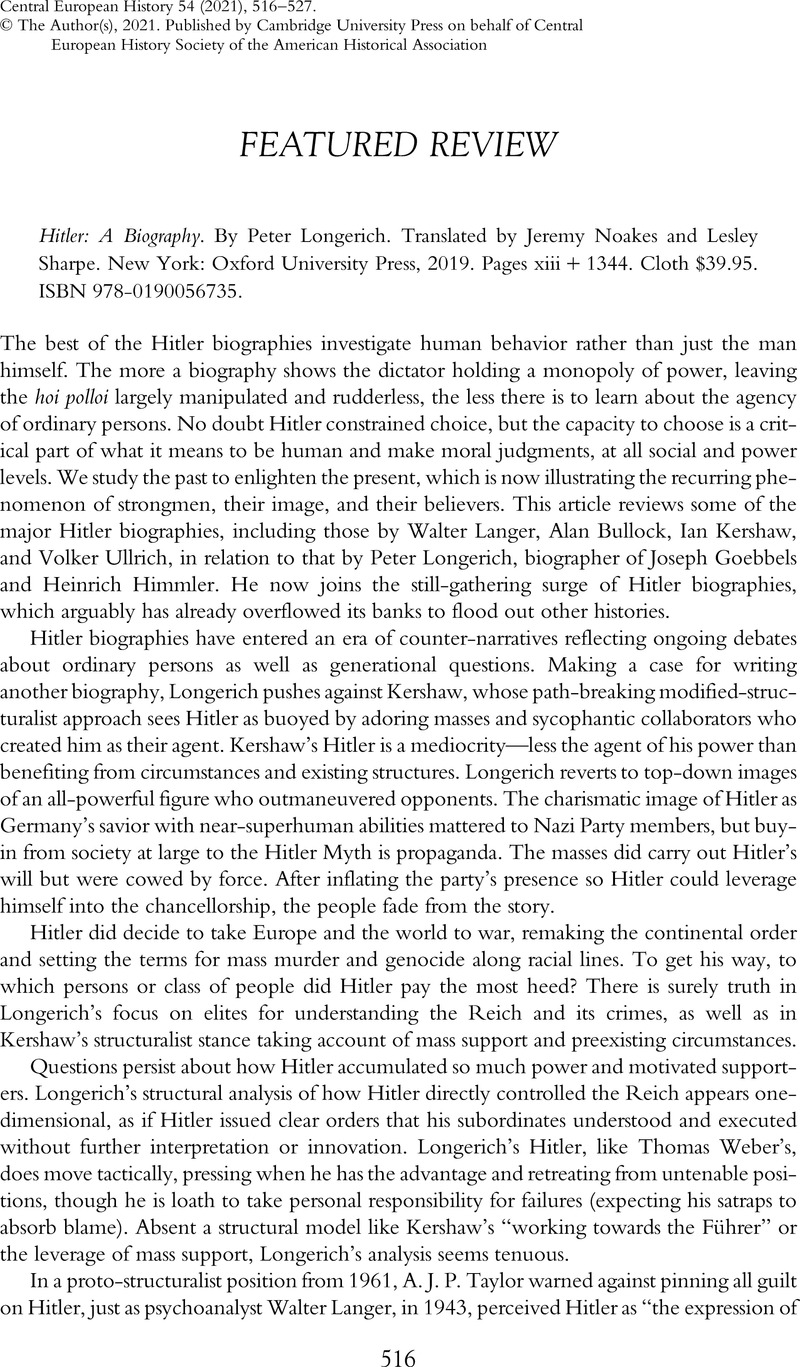No CrossRef data available.
Article contents
Hitler: A Biography. By Peter Longerich. Translated by Jeremy Noakes and Lesley Sharpe. New York: Oxford University Press, 2019. Pages xiii + 1344. Cloth $39.95. ISBN 978-0190056735.
Review products
Published online by Cambridge University Press: 29 September 2021
Abstract

- Type
- Featured Review
- Information
- Copyright
- Copyright © The Author(s), 2021. Published by Cambridge University Press on behalf of Central European History Society of the American Historical Association
References
1 Taylor, A. J. P., “Second Thoughts,” Origins of the Second World War (New York: Simon and Schuster, 1961), xixGoogle Scholar; Langer, Walter, The Mind of Hitler: The Secret Wartime Report (New York: Basic Books, 1972), 144Google Scholar.
2 Langer, The Mind of Hitler, 142–44.
3 Langer, The Mind of Hitler, 85, 144; Bauman, Zygmunt, Modernity and the Holocaust (Ithaca, NY: Cornell University Press 1989)Google Scholar.
4 Kershaw, Ian, Hitler 1889–1936: Hubris (New York: W.W. Norton, 1999), 536Google Scholar.
5 Waller, James, Becoming Evil (Oxford and New York: Oxford University Press, 2002), 62Google Scholar.
6 Haffner, Sebastian, The Meaning of Hitler (New York: MacMillan, 1979), 3Google Scholar.
7 Bullock, Alan, Hitler: A Study in Tyranny (London: Odhams Press, 1952), 46Google Scholar.
8 Paxton, Robert, The Anatomy of Fascism (New York: Vintage Books, 2005), 9Google Scholar.
9 Bullock, Hitler, 44–45.
10 Bullock, Hitler, 68, 69.
11 Bullock, Hitler, 45, 69.
12 Langer, The Mind of Hitler, 72.
13 Langer, The Mind of Hitler, 71.
14 Mein Kampf, cited in Langer, The Mind of Hitler, 72–73.
15 Bullock, Hitler, 397, 405.
16 Bullock, Hitler, 72.
17 Bullock, Hitler, 55.
18 Anthony Ramirez, “Outcry over Use of Hitler Quote in Yearbook,” New York Times, June 18, 1999 (https://www.nytimes.com/1999/06/18/nyregion/outcry-over-use-of-hitler-quote-in-yearbook.html); Nicholas Bogel-Burroughs, “Kentucky Police Training Quoted Hitler and Urged ‘Ruthless’ Violence,” New York Times, October 31, 2020 (https://www.nytimes.com/2020/10/31/us/kentucky-state-police-hitler.html); Adolf Hitler, Mein Kampf (Munich: Eher Verlag, 1943), 186–87, 189.
19 Langer, The Mind of Hitler, 142.
20 Caestecker, Frank and Fraser, David, “The Extraterritorial Application of the Nuremberg Laws: Rassenschande and ‘Mixed’ Marriages in European Liberal Democracies,” Journal of the History of International Law 10, no. 1 (2008): 35–81CrossRefGoogle Scholar.
21 Kershaw, Hitler 1889–1936, xxix.
22 Kershaw, Hitler 1889–1936, 530; Ian Kershaw, “‘Working Towards the Führer’: Reflections on the Nature of the Hitler Dictatorship,” Contemporary European History 2, no. 2 (July 1993): 117.
23 Kershaw, Hitler 1889–1936, 332.
24 Kershaw, Hitler 1889–1936, 260, 458.
25 Kershaw, Hitler 1889–1936, 473, 535, 585–86.
26 Kershaw, Hitler 1889–1936, 450.
27 Bullock, Hitler, 281–92.
28 Kershaw, Hitler 1889–1936, 520.
29 Kershaw, Hitler 1889–1936, 474.
30 Kershaw, Hitler 1889–1936, 494.
31 Volker Ullrich, Hitler: Ascent 1889–1939, trans. Jefferson Chase (New York: Knopf, 2016), 646.
32 Hitler, quoted in Longerich, Hitler: A Biography, 411.
33 Ian Kershaw, Hitler 1889–1936: Nemesis (New York: W.W. Norton, 2000), 522.
34 For what Martin Bormann described as Hitler's “fundamental decisions” dividing intermarried Jews into privileged and nonprivileged categories, see Nuremberg Document 069-PS.
35 Volker Ullrich, Hitler: Downfall 1939–1945, trans. Jefferson Chase (New York: Knopf, 2020), 282.
36 December 6, 1943, entry in Joseph Goebbels, Die Tagebücher von Joseph Goebbels—Sämtliche Fragmente, ed. Elke Fröhlich, part II, vol. 10 (Munich: Saur, 1987–2008).
37 Kershaw, Hitler 1889–1936, 178.
38 See also Joachim Neander, “Auschwitz, the ‘Fabrikaktion,’ Rosenstrasse: A Plea for a Change of Perspective in Protest,” in Protest in Hitler's “National Community,” ed. Nathan Stoltzfus and Birgit Meyer-Katkin (New York and Oxford: Berghahn Books, 2015), 125–42, esp. 132–33, and Appendix 8, 251–54.
39 Nathan Stoltzfus, Hitler's Compromises: Coercion and Consensus in Nazi Germany (New Haven: Yale University Press, 2016), 271; Julie Torrie, “For Their Own Good”: Civilian Evacuations in Germany and France, 1939–1945 (New York: Berghahn Books, 2010), 111.
40 November 2, 1943, entry in Goebbels, Die Tagebücher von Joseph Goebbels, part II, vol. 10.
41 Katharina von Kellenbach, “The ‘Legend’ of Women's Resistance in the Rosenstrasse,” in Protest in Hitler's National Community, 106–24.


